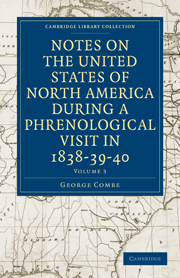Summary
July 18. Cape Cottage.—Ever since we left New York, we have been looking for some calm and cool retreat in which to spend the remainder of the summer. We happened to take up a Portland newspaper which contained an advertisement of the accommodations and agrements presented by Cape Cottage, situated in the neighbourhood of this town, and they seemed to be so exactly what we wanted, that we have come hither to inspect them. To our great joy, they even exceed the description, and are in every respect to our mind. We have, therefore, engaged apartments here for several weeks.
John Quincy Adams and Negro Slavery.—Mr Adams has addressed a Letter to the Anti-Slavery Petitioners, which has been published. He says that “the Declaration of Independence derives all the just power of government from the consent of the governed;” and that as “it is certain that a great majority of the inhabitants of the District of Columbia are utterly averse to the abolition of slavery among them,” it follows that “the immediate abolition of slavery by Congress cannot possibly be effected with justice to the inhabitants of the district.” At first sight this argument appeared to me to be reasonable, but on a rigid scrutiny, it will be found to contain a fallacy. Mr Adams assumes the slaves to be mere chattels, and the white inhabitants of the district alone to be men.
- Type
- Chapter
- Information
- Publisher: Cambridge University PressPrint publication year: 2010First published in: 1841



